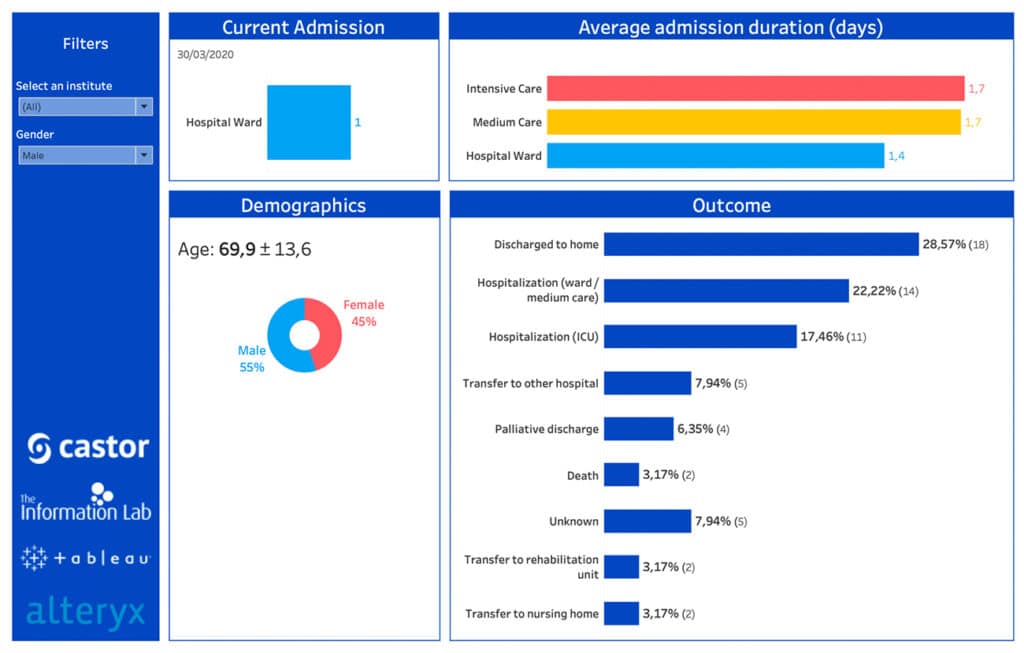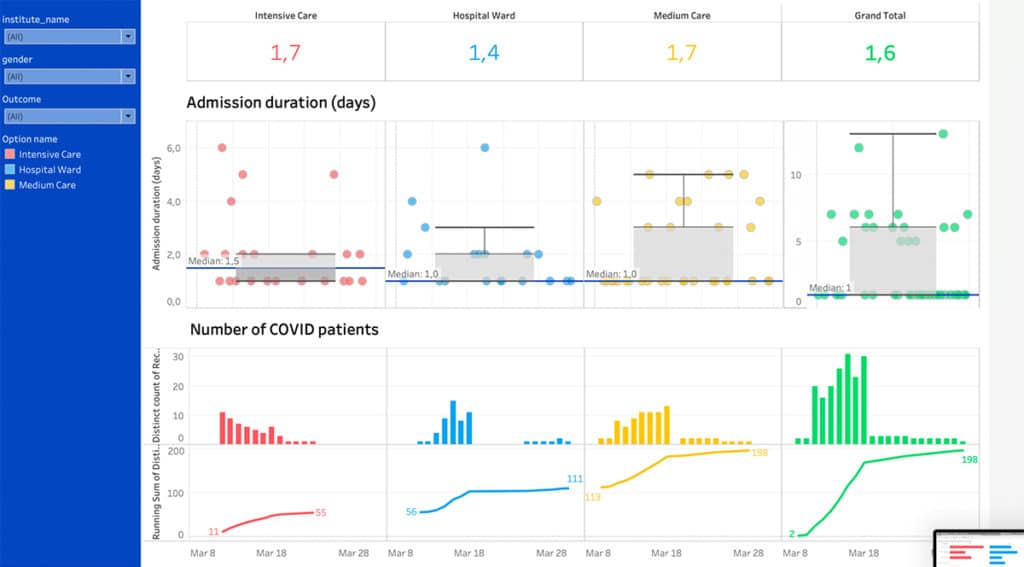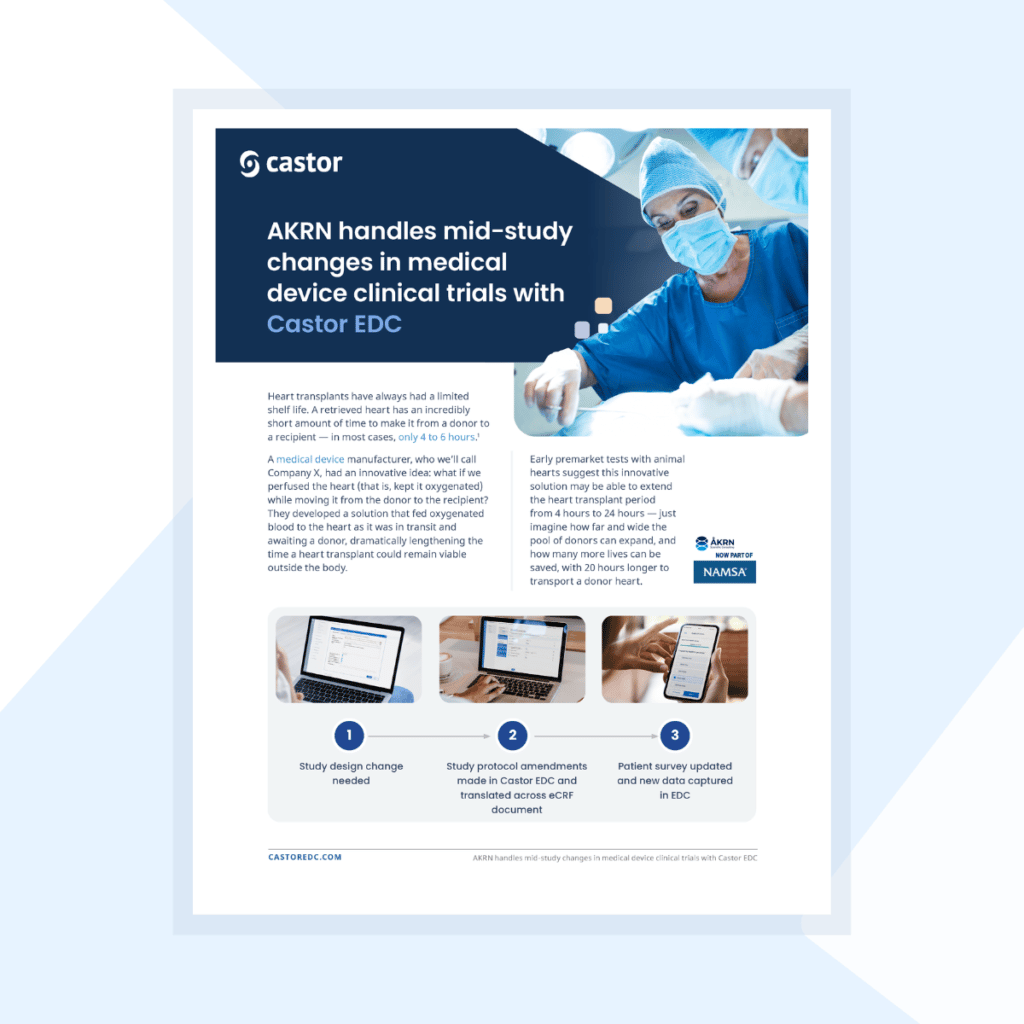The ongoing COVID-19 pandemic is one of the most serious health crises in modern history, affecting an unprecedented swathe of society. Hospital overcrowding is an alarming consequence of SARS-CoV-2, requiring careful allocation of limited resources to ensure the most grievously ill patients receive the highest level of care.
An impediment to accomplishing this allocation is the broad diversity in symptoms and severity between patients, and clinicians often feel that even a previously-stable patient could become critical at any time. This dangerous uncertainty highlights the difficulty doctors face in deciding which patients should enter the intensive care unit (ICU), and which are likely to improve despite being ill enough to require hospitalization.
Amidst the chaos, Dr. Martijn Beudel along with researchers at Amsterdam UMC and Maastricht UMC+ are pioneering a new kind of patient risk assessment to combat the crisis: machine learning.
How COVID-PREDICT is using Castor
Castor is supporting COVID-PREDICT by providing its electronic data capture (EDC) system free of charge to help the team easily capture data from multiple sources. Algorithms for predicting disease outcomes are being created and tested with data that are retrieved in real-time through Castor’s API, which enables integrations with a wide range of other tools. These algorithms will assist in predicting the probability that a patient will require intensive care, and if so, what the likely outcome will be. These algorithms will be organized into dashboards as seen below:

Castor’s Enterprise Tableau integration is used to pass data to Tableau, a widely-used business intelligence tool. Thanks to hosting with TRUE, this tool built and managed by The Information Lab has been granted free licenses from Alteryx and Tableau to assist in studying COVID-19. The dashboards will give an overview of admissions to the ICU, MCU (medium care unit), and hospital wards, as well as visualize the outcomes, comorbidities, and complications.

Castor is also developing a semantic data model together with other organizations in the GO-FAIR Virus Outbreak Data Network (VODAN). This Findable, Accessible, Interoperable, and Reusable research (meta)data assists researchers in knowing what other types of COVID-19 research is being carried out by their colleagues worldwide, and enables them to contribute to a central data set to perform analysis on a broader patient cohort.
Research Overview
The Dutch healthcare system has mounted a committed effort to keep its citizens safe, but despite the brave actions of doctors, nurses, and healthcare workers across the country, intensive care facilities are reaching capacity well before the number of infected peaks. The vital task of deciding who is transferred to intensive care, how long they must remain there, and who can wait out the disease in general care is a significant impediment to effective patient flow given the recency and lack of data about the virus. Currently, it is virtually impossible to direct intensive care transfers at the level of precision necessary for the crisis, when the lives of thousands of critically ill people are at stake, and this is where COVID-PREDICT aims to help.
Study Design and Methodology
 Researchers at Amsterdam UMC and Maastricht UMC+ under the direction of Dr. Beudel have designed a system using machine learning to determine likely outcomes for individual patients; that is to say, who is at greater risk of requiring intensive care among those hospitalized. To accomplish this, Dr. Beudel and his team are entering retrospective cohort data from COVID-19 cases according to the WHO-COVID-19 standard CRF into a national database, and analyzing it using a machine learning system. Outcomes at 1, 2, 3, and 6 weeks are recorded along with responses to treatment.
Researchers at Amsterdam UMC and Maastricht UMC+ under the direction of Dr. Beudel have designed a system using machine learning to determine likely outcomes for individual patients; that is to say, who is at greater risk of requiring intensive care among those hospitalized. To accomplish this, Dr. Beudel and his team are entering retrospective cohort data from COVID-19 cases according to the WHO-COVID-19 standard CRF into a national database, and analyzing it using a machine learning system. Outcomes at 1, 2, 3, and 6 weeks are recorded along with responses to treatment.
Their project, which is expected to last between March and June of 2020, aims to make optimal use of the existing capacity within the Dutch healthcare system, improve patient flow within the hospital system, and deliver critical care services to the patients who need it most.
About the Team
Dr. Martijn Beudel is a neurologist with a special interest in movement disorders and neuromodulation (Deep Brain Stimulation (DBS). Since the COVID-19 crisis emerged, Dr. Beudel temporarily shifted focus to COVID-19, and has mobilized members of his DBS research team to assist with the COVID-PREDICT project:
- Dr. M. J.H. Aries, Neurologist at Maastricht UMC+
- Dr. P.L. Kubben, Neurologist at Maastricht UMC+
- Dr. M.L.F. Janssen, Neurologist and Clinical Neurophysiologist at Maastricht UMC
- Dr. W.V. Potters, Technical Physician at Amsterdam UMC
- Dr. D.A.I Piña-Fuentes, Postdoctoral Researcher at Amsterdam UMC
- Dr. G.A. van Wingen, Professor of Neuroimaging in Psychiatry at Amsterdam UMC
Click here to read about other COVID-19 studies supported by Castor innovation.



